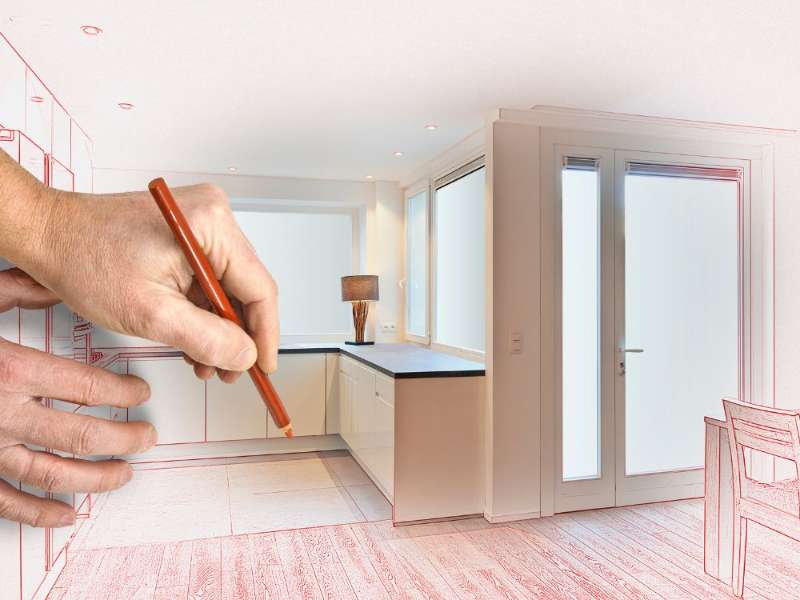House flipping is a strategy where you buy a property, renovate it, and sell it quickly for a profit. The goal is to find a property that’s undervalued or in need of repairs, make improvements, and sell it for more than you paid.
The process involves purchasing a property below market value, renovating it to increase its appeal, and then flipping it for a profit. It’s a popular way to invest in real estate, especially in markets like Scotland, where renovation opportunities can offer strong returns. This article will show you how to budget effectively and finance your house flip in Scotland.
Breaking Down Your House Flipping Budget
A successful house flip starts with a solid budget. Knowing exactly how much you’re going to spend on each part of the process helps you stay on track and avoid surprises. The main costs involved in a property flip include purchase costs, renovation expenses, and selling fees. Here’s a breakdown of what to expect:
1. Purchase Costs
The first thing you’ll need is the capital to buy the property. The purchase price is just the beginning. You’ll also need to factor in a deposit, which is typically around 10% of the property’s value. For example, if you buy a house for £400,000, your deposit will be £40,000. If you’re working with a joint venture (JV) partner, the remaining £360,000 may be paid in cash, helping you avoid higher-interest loans.
2. Renovation Costs
Renovations are where most of your budget will go. Break these costs down accurately to avoid running over budget. Key renovation costs include:
Materials: Basic building materials such as timber, plaster, and tiles can cost thousands. For example, general materials for renovations could be around £22,000.
Labour and Trades: You’ll need electricians, plumbers, plasterers, and other tradespeople. This can run up to £50,000 for a standard renovation, depending on the size of the property and the level of work needed.
- Specific Renovations:
- Kitchen: £4,500 for cabinets, £900 for worktops, and another £2,500 for appliances.
- Bathroom: Around £900 for a simple renovation.
- Flooring: £2,800 for materials and installation, including carpet, tiles, or wood flooring.
- Exterior: £1,200 for exterior paint and repairs to boost curb appeal.
Roofing: Around £850 for repairs such as replacing sheets or screws.
3. Additional Work
Sometimes you’ll need to do extra work beyond the basics:
Deck and Pathway: Timber for a deck extension might cost £1,500, while improving the pathway could cost another £300.
Sliding Doors: If replacing sliding doors, you could pay about £600 for a second-hand door and installation.
4. Miscellaneous Costs
Don’t forget about smaller costs that can add up, like rubbish removal (£400), van hire (£220), and staging the property for sale (£3,500).
Financing Your Property Flip
Getting the right financing is key to making a house flip work. You’ll need enough cash not just to buy the place, but also to cover repairs and any surprises along the way. How you fund it all depends on where you’re at financially and how much experience you’ve got in the game.
1. Traditional Mortgages
For those with strong credit and a stable financial background, a traditional mortgage might be the best option. This route typically offers lower interest rates, but the process can take longer, and you’ll need to meet the lender’s requirements. It’s worth considering if you plan to keep the property for a while before flipping it.
2. Bridging Loans
Bridging loans are short-term loans designed for property transactions. They’re ideal for house flipping, as they allow you to buy a property quickly and start renovations without waiting for long approval processes. However, bridging loans tend to come with higher interest rates, so you’ll need to ensure that your project timeline allows for a profitable sale.
3. Joint Venture (JV) Partnerships
Joint venture partnership could be a great option. In this arrangement, you team up with an investor who provides the majority of the capital, while you handle the renovation and management. Profits are split based on the agreement, giving you access to funds without having to take on all the financial risk.
4. Private Investors
Private investors can offer another way to fund your property flip. These individuals or companies may provide loans or equity financing in exchange for a return on their investment. The terms can vary widely, so it’s important to ensure both parties understand the agreement before moving forward. This option can be faster than a bank loan and might be more flexible in terms of repayment.
5. Personal Savings
Using your own savings to finance a flip can save you from paying interest and dealing with the complexities of loans or partnerships. However, using personal funds carries higher risks, as your savings are tied to the success of the project. If you’re confident in your ability to manage the flip, this could be a viable option.
Renovating the Property
Renovating a property can add significant value and impact profit, but it's important to be strategic and realistic about the changes made. Rather than focusing on high-cost renovations, concentrate on improvements with the best return on investment.
Key areas like the kitchen and bathroom have a big impact on a property’s value. Spending £4,500 on kitchen cabinets and £2,500 on appliances can make a noticeable difference, while a £900 bathroom renovation can enhance marketability.
New flooring and fresh paint can makeover a property affordably, with £2,800 on flooring and £1,200 on exterior paint significantly improving curb appeal. Structural improvements like roof repairs or replacing damaged sheets may cost around £850 but can increase the property’s value.
Adding functionality, such as extending a deck or replacing sliding doors for £1,800 and £600 respectively, can make the space more attractive to buyers. Finally, staging the property with a £3,500 budget can help potential buyers envision themselves in the space and showcase its best features.
Legal and Regulatory Considerations
One of the key aspects to consider is the missives process, a legal contract that binds you to the property once an agreement is reached with the seller. Unlike in other parts of the UK, the contract in Scotland is final once the missives are concluded. This makes it crucial to have a solicitor review the terms before you commit, as the process is legally binding and there’s no backing out after the agreement is made.
Equally important is ensuring you’ve covered all the legal aspects related to the property itself. Checking the Title Deeds is critical—they outline the property's legal history and any potential disputes. A thorough review will also identify restrictions or legal conditions that might affect your renovation plans, such as listed building status or boundary issues. Having a professional surveyor assess the property before purchase can uncover hidden risks, saving you from costly surprises later.
Planning and building permits are also significant. If you’re making structural changes, such as adding an extension or modifying walls, you must obtain proper planning permission. In some cases, even cosmetic changes might need approval. Make sure your renovations comply with local council regulations to avoid fines or having to undo the work.
Finally, be aware of taxes and fees like the Land and Buildings Transaction Tax (LBTT). This tax is similar to stamp duty in other parts of the UK and must be paid when purchasing a property. The rate depends on the property price and can add a significant amount to your upfront costs.
Conclusion
Properly budgeting and financing your house flip is the foundation of a successful project. By understanding all the costs involved—purchase, renovation, holding, and selling—you’ll have a clear picture of what you need to make a profit. Whether you're financing with a loan, joint venture, or private investors, having a solid plan will make all the difference.
Stewart Thomson Property offers expert coaching to help you navigate every step of the process—from budgeting to finding the right property. Reach out today to get started.



































